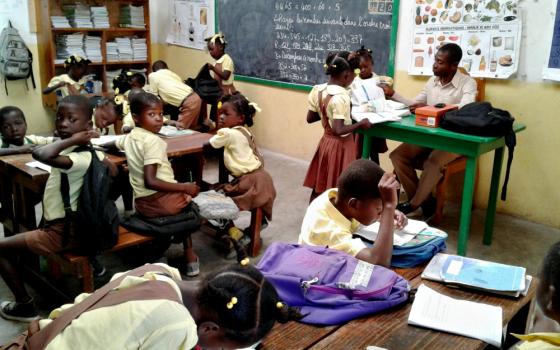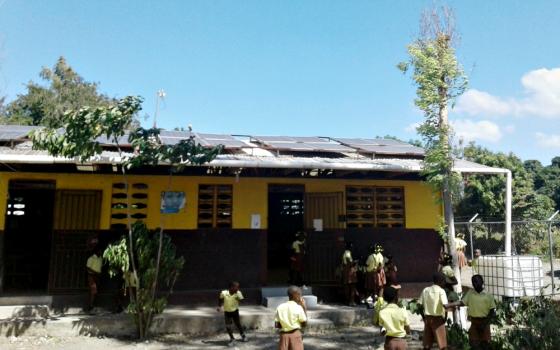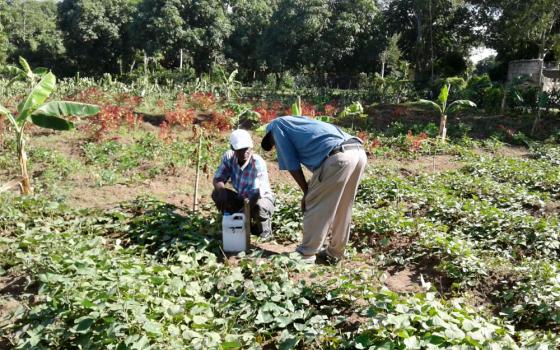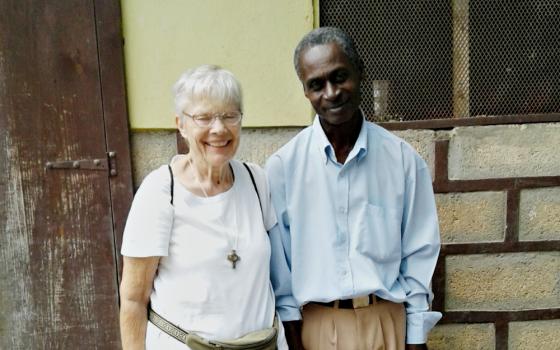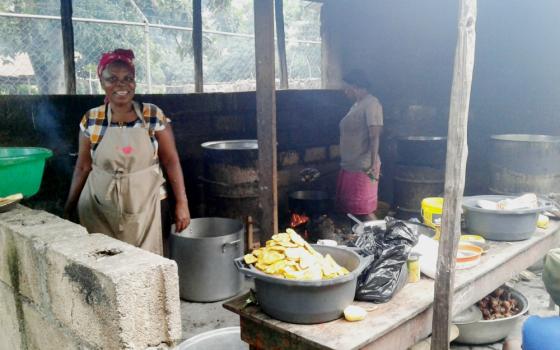Notes from the Field includes reports from young people volunteering in ministries of Catholic sisters. A partnership with Catholic Volunteer Network, the project began in the summer of 2015. This is our seventh round of bloggers: Viviana Garcia-Blanco is a Dominican Volunteer at the United Nations and Geri Lanham is a volunteer with the Religious of Jesus and Mary in Gros Morne, Haiti.
___
Giving directions to Lekòl Jezi-Mari, a primary school in the neighborhood zone of Fon Ibo, is a bit morbid. The first landmark is a mint green morgue, followed by the stump of a mango tree.
But then the landmarks change and become living and life-giving. As I walk along the dirt road, I pass living walls of cacti that mark a garden's boundaries and an attempt to protect the growing produce from the never-satisfied stomachs of the local goat population. Then I follow the final bend in the road and am greeted by the cheerful yellow-and-chocolate-brown walls of Lekòl Jezi-Mari.
There is no mistaking this place, with its large, bright buildings. It is a testament to permanence in an agrarian neighborhood of subsistence-farm families where people struggle to put food on the table each day.
As I approach, I see students looking sharp in their pressed sunshine-yellow and chocolate-brown uniforms. These 576 students are a living, breathing embodiment of Lekòl Jezi-Mari and the education they are receiving, which is a lifeline for many of their families.
The majority of these students come from low socioeconomic backgrounds. For them, the school is not just a place of book learning. It is also a place to learn life skills and to learn to interact with one another and with teachers who have compassion for them and who want them to succeed against the odds stacked against them. Some of these students will be the first in their families to graduate from sixth grade.
After an afternoon rain shower, I am always humbled to see how the older students pick up the younger students and place them on their backs to carry them across the muddy river that before the rain had been a road. No adult asks them to do this, but the older students feel a responsibility to help the younger ones arrive at their destination. I do not have the balance to pick up anything or anyone on the muddy road, so I am in awe to see sixth-graders balancing a kindergartener in front, a second-grader in back, and their backpacks on their heads. These students may not be taller than me, but their sheer force of will makes them far stronger than me on this path.
Lekòl Jezi-Mari started under a mango tree in 1998. It was a group of children brought together by Claude Etienne and Jean Desinor, two community leaders in Fon Ibo who believe the children of the neighborhood merit a formal education.
Since that simple beginning, Lekòl Jezi-Mari has blossomed under the care of Sr. Pat Dillon of the Religious of Jesus and Mary, who has seen the school grow from a single classroom building to 16 classrooms today. The parish school is administered by the Religious of Jesus and Mary, and although it is a Catholic grade school, it welcomes students of any religion.
Sister Pat works tirelessly with Claude and Mèt Leny, the principal, to create a compassionate learning environment where the students can strive to achieve their potential. This includes engaging with the parents, many of whom are illiterate, to encourage them to support the learning of their children to the best of their ability.
When students have a scuffle on the playground that comes to blows, they do not face corporal punishment. The students face something much harder: a mandatory attitude adjustment. Mèt Leny hears both sides of the disagreement then sends the offending parties to sit under the mango tree to think about what they did. When they have calmed down and come to an understanding of how they will live together peaceably, they return to Mèt Leny and explain to him their solution to the disagreement. Lekòl Jezi-Mari students are challenged to learn and live the fact that one's right to swing one's arm ends when it hits another's face.
Lekòl Jezi-Mari students have some life-changing opportunities when they come to school. Thanks to the support of Mercy Focus on Haiti, Friends of Haiti and Fundación Juntos Mejor, the students enjoy a midday meal, which gives them the strength to learn. The lunch program is augmented with produce from the school garden, which is tended by the fifth-grade class.
Each week, classes spend at least one session in the solar-powered computer lab, where students use their math skills to save penguins from falling asteroids and do further research to expand their knowledge of topics in their history books. Students learn about their place in the world, and they are invited to think about how they will strive to change the reality of their neighborhood in order to begin to change the reality of their country.
There is a Haitian proverb, "Ti pa ti pa zwazo fè nich," which means, "Little by little, the bird builds its nest." Step by step, we change the world. The kindergarten teachers participate in a formation program called ti pa ti pa, since they are helping the children take their first steps into learning.
With the foundation they receive at Lekòl Jezi-Mari, these little ones will be able to grow into bright young people who will have the skills and the capacity to be life-giving agents of change in their families and in their community if they can only find the opportunity to utilize these skills growing within them.
[Geri Lanham lives in community with the Religious of Jesus and Mary in Gros Morne, Haiti.]
